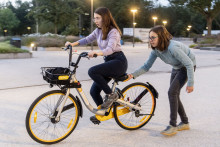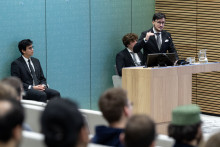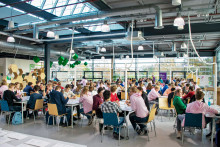When the members of 4 Happy Feet finish dancing and the Hogekampplein is deserted, five new international students and three members of Klein Verzet come together. The trio will teach the students from Yemen, Bulgaria, Romania and Turkey how to ride a bicycle. The magic word? Patience. While Omar Bin Mahfoodh from Yemen can't wait to slalom through the cones, İdil Ağabeyoğlu from Turkey - protected by a helmet - needs more time.
'And that is fine. As Dutchmen, we can hardly imagine it, but getting on a bicycle for the first time is strange. A very narrow machine on two wheels where you quickly lose your balance. You don't get it right the first time,' says Joris van den Biggelaar, board member of Klein Verzet.
Removing the pedals
After a short explanation by the three 'instructors', all the pedals are removed from the bikes and the saddle is lowered as far as possible. This produces surprised faces among the participants, but to get a feeling for balance, the bicycle is first used as a step. Some people find this easier than others. Bin Mahfoodh tells while scooting that he has lived in Yemen and Saudi Arabia. 'But nobody rides a bicycle there. I already drive a car, but I have never cycled before. I bought this bike last week and I hope to learn fast.'
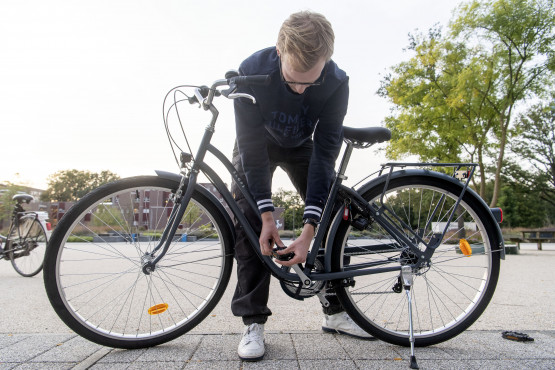
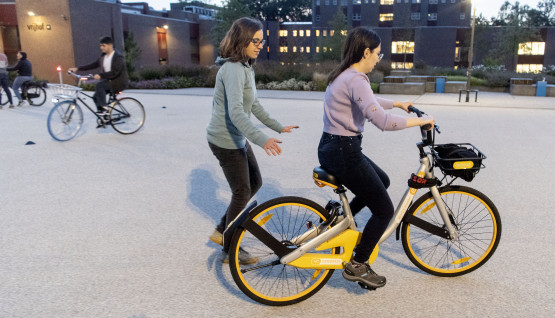

The students from Turkey, Romania and Bulgaria explain their late cycling debut with a similar motive. People do cycle in their native countries, but not nearly as much as in the Netherlands. There are hardly any bicycle lanes, which makes this a dangerous activity. Ağabeyoğlu: 'I even heard that the Netherlands has more bicycles than inhabitants, is that right?' When Van den Biggelaar says he has four, her mouth drops open in amazement.
The next step
Especially the men are ready for the next step after a few rounds of stepping: one pedal can be attached to the bicycle again. The second task is to push off on the pedal and step, where it is slightly more difficult to keep balance. If this is also successful, the second pedal follows and the participant can start the real work. Bin Mahfoodh gets the hang of it in no time, although he has to get used to the idea of his saddle being raised. The ladies have to cope with trial and error but, by the end of the hour, everyone is able to keep their balance on their own.
Van den Biggelaar: 'This is nice work to do. Teaching people something is always great. Because cycling is so common in the Netherlands, the three of us did some research on how you can teach someone in steps. Now, the focus is on cycling and balance, but in the next lesson, we will also talk about traffic awareness. Looking at the traffic in the centre of Enschede, traffic rules are just as important.'
incentive fund
The idea of a cycling course for international students who cannot cycle (properly) was submitted by Brechje Maréchal, policy officer for Environment & Sustainability. Together with the Sports Centre and Klein Verzet, she devised the course, because confident cycling is one of the aspects that supports integration and participation of international students and staff within the UT community. It also fits in with the UT's ambition to reduce its carbon footprint by 15 per cent by 2023.
Interested students or staff members can still register here.


